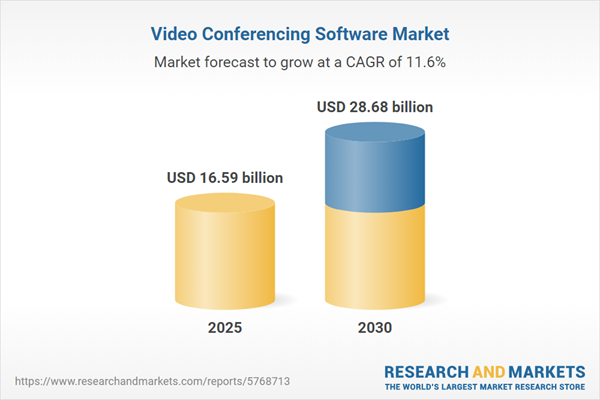Video conferencing represents a live, visible connection between two or more distant individuals via the internet, simulating face-to-face interactions. This technology is essential as it enables collaboration among people who might otherwise be unable to meet in person. The global video conferencing software market is experiencing growth driven by escalating demand from enterprises worldwide, the prevalence of work-from-home cultures, and heightened globalization. Further propulsion comes from the integration of advanced technologies such as artificial intelligence (AI), machine learning (ML), and the Internet of Things (IoT), alongside widespread adoption of devices like smartphones, laptops, and tablets.
Despite these drivers, market expansion faces constraints, including inadequate network and connectivity infrastructure, a shortage of knowledge and skilled personnel - particularly in developing and underdeveloped regions - and the elevated costs of video conferencing software. These factors are anticipated to hinder growth during the forecast period. Conversely, opportunities abound through the availability of cutting-edge hardware solutions, such as 4K cameras and premium microphones, as well as ongoing product development and innovation, which empower key market players to capitalize on emerging demands.
A primary driver for the video conferencing software market is the surging demand from business firms and corporations. Desktop video conferencing serves as a vital component of unified communications platforms in the corporate sector, incorporating features like calling and texting. Many vendors offer standalone on-premises and cloud-based solutions that integrate seamlessly into enterprise applications. The transition toward hybrid and remote work models has amplified this demand, with companies increasingly adopting flexible arrangements for employees. For instance, projections indicate that hybrid work scenarios could rise significantly by 2024. Additionally, a substantial portion of businesses continue to support remote work options, fostering sustained reliance on video conferencing tools.
The adoption of video conferencing enhances productivity while reducing the expenses associated with traditional in-person meetings. Global enterprises are leveraging these systems for virtual meetings, discussions, and group webinars to optimize time and operational costs. Surveys from leading providers highlight that video conferencing markedly improves employee efficiency for the majority of organizations. Consumer interest in web and video conferencing solutions has also surged dramatically in recent years, as evidenced by trends in search data.
From a geographical perspective, North America holds a dominant share in the video conferencing software market. This region's growth is fueled by its advanced network infrastructure and the mature adoption of emerging technologies, including video conferencing, in countries such as the United States, Canada, and Mexico. Video conferencing facilitates efficient live interactions among dispersed participants using video-enabled devices, supporting video, text, audio, or presentations over the internet. The internet's pivotal role in this ecosystem is underscored by robust infrastructure in the United States, which boasts a high density of communication businesses and service providers. This ecosystem drives market expansion, with increasing internet penetration and user bases expected to further accelerate adoption.
In summary, the video conferencing software market is poised for continued advancement, balancing strong drivers like technological integration and corporate demand against infrastructural and cost-related challenges. Opportunities in hardware innovation and product evolution position industry leaders for strategic gains, particularly in tech-savvy regions like North America. As enterprises prioritize efficiency and connectivity in hybrid environments, the market's trajectory remains upward, emphasizing the need for targeted investments in infrastructure and skills development to overcome barriers in less mature markets.
Key Benefits of this Report:
- Insightful Analysis: Gain detailed market insights covering major as well as emerging geographical regions, focusing on customer segments, government policies and socio-economic factors, consumer preferences, industry verticals, and other sub-segments.
- Competitive Landscape: Understand the strategic maneuvers employed by key players globally to understand possible market penetration with the correct strategy.
- Market Drivers & Future Trends: Explore the dynamic factors and pivotal market trends and how they will shape future market developments.
- Actionable Recommendations: Utilize the insights to exercise strategic decisions to uncover new business streams and revenues in a dynamic environment.
- Caters to a Wide Audience: Beneficial and cost-effective for startups, research institutions, consultants, SMEs, and large enterprises.
What do businesses use these reports for?
Industry and Market Insights, Opportunity Assessment, Product Demand Forecasting, Market Entry Strategy, Geographical Expansion, Capital Investment Decisions, Regulatory Framework & Implications, New Product Development, Competitive IntelligenceReport Coverage:
- Historical data from 2022 to 2024 & forecast data from 2025 to 2030
- Growth Opportunities, Challenges, Supply Chain Outlook, Regulatory Framework, and Trend Analysis
- Competitive Positioning, Strategies, and Market Share Analysis
- Revenue Growth and Forecast Assessment of segments and regions including countries
- Company Profiling (Strategies, Products, Financial Information, and Key Developments among others.
Key Market Segments
By Deployment Model
- On-Premise
- Cloud
By Enterprise Size
- Small
- Medium
- Large
By Industry Vertical
- Education
- Communication and Technology
- Defense
- Healthcare
- BFSI
- Others
By Geography
- North America
- United States
- Canada
- Mexico
- South America
- Brazil
- Argentina
- Others
- Europe
- Germany
- France
- United Kingdom
- Spain
- Italy
- Others
- Middle East and Africa
- Saudi Arabia
- Israel
- Others
- Asia Pacific
- China
- Japan
- South Korea
- India
- Indonesia
- Thailand
- Taiwan
- Others
Table of Contents
Companies Mentioned
- Zoom Communications Inc.
- Microsoft
- Cisco
- GoTo
- BlueJeans
- Dialpad Inc
- TeamViewer
- LifeSize
- Zoho Corporation Pvt Ltd
Table Information
| Report Attribute | Details |
|---|---|
| No. of Pages | 149 |
| Published | August 2025 |
| Forecast Period | 2025 - 2030 |
| Estimated Market Value ( USD | $ 16.59 billion |
| Forecasted Market Value ( USD | $ 28.68 billion |
| Compound Annual Growth Rate | 11.5% |
| Regions Covered | Global |
| No. of Companies Mentioned | 10 |









